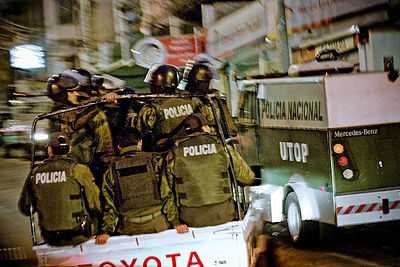Crime in Bolivia

Crime in Bolivia is investigated by the Bolivian police.
Crime by type
Murder
In 2012, Bolivia had a murder rate of 12.1 per 100,000 population.[1] There were a total of 1,270 murders in Bolivia in 2012.[1]
Illegal drug trade
The Bolivian government has since 2004 implemented a policy of voluntary participation of farmers from all coca-growing regions in Bolivia. For instance, farmers in Chapare are allowed to grow one cato of coca per year.[2] Any coca grown beyond that limit, or any cultivation outside of approved coca-cultivation regions such as Chapare, is subject to elimination. The strategy relies on coca growers federations’ ability to enforce the agreement. Such federations are influential, and penalties for violations by farmers or lax enforcement by federations can be stern (including seizure of lands). As a result, coca cultivation in Bolivia fell to 27,200 hectares in 2011 from 31,000 hectares in 2010 - a 12 per cent decrease.[2]
Domestic violence
Domestic violence in Bolivia is a pervasive and underreported problem.[3] According to the Center for the Information and Development of Women (CIDEM), 70 percent of women suffer some form of abuse.[3]
CIDEM noted that their 2006 statistics "did not reflect the full magnitude of the problem of violence against women" and that "a great number of women" did not report the aggression they faced on a daily basis.[3] The most exhaustive national survey on domestic violence conducted by the National Statistical Institute in 2003 showed 64 percent of women were the target of some form of emotional, physical, or sexual abuse from their partner.[3]
References
- ↑ 1.0 1.1 Global Study on Homicide. United Nations Office on Drugs and Crime, 2013.
- ↑ 2.0 2.1 Ledebur, K. and Youngers, C. 2013. From Conflict to Collaboration: An Innovative Approach to Reducing Coca Cultivation in Bolivia. Stability: International Journal of Security and Development 2(1):9, DOI: http://dx.doi.org/10.5334/sta.aw
- ↑ 3.0 3.1 3.2 3.3 Report on Human Rights Practices 2006: Bolivia. United States Bureau of Democracy, Human Rights, and Labor (March 6, 2007). This article incorporates text from this source, which is in the public domain.
| |||||||||||||||||||||||||||||||||||||||||
| |||||||||||||||||||||

